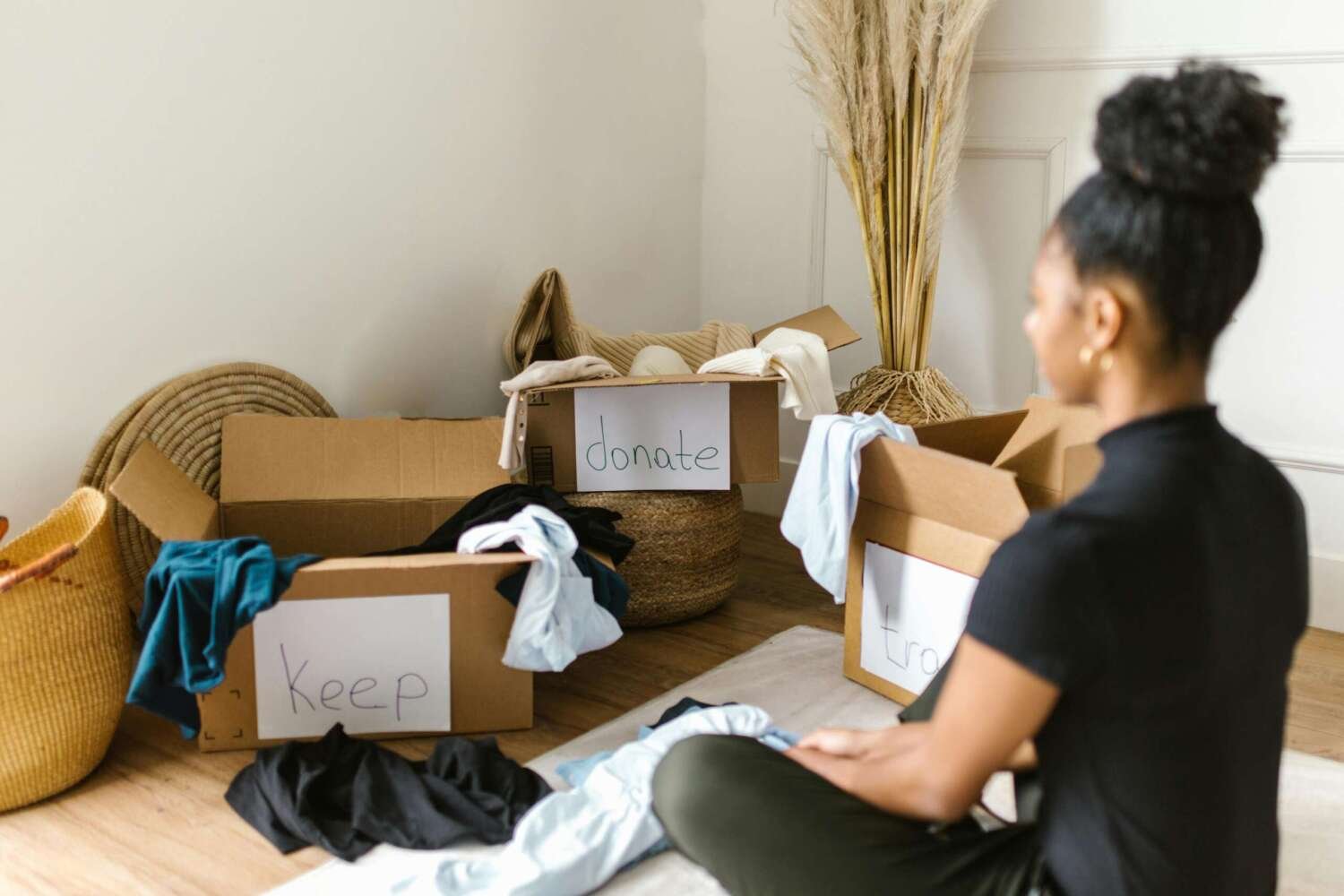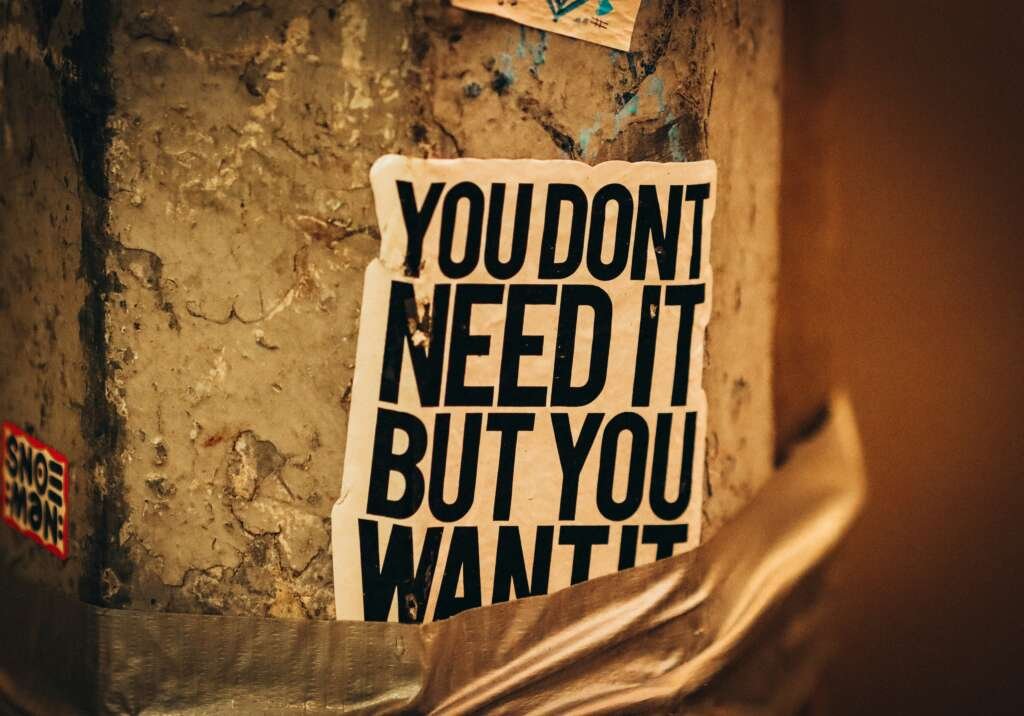How to Buy Nothing, Declutter, & Live A Simpler, Happier Life

Share This Article
Tired of overconsumption and fast fashion? We asked a decluttering expert how to adopt a simpler lifestyle and be happy as part of the Buy Nothing movement.
| All products featured on The Wellness Feed are independently selected by our editors for their environmental and ethical impact. However, when you buy something through our retail links, we may earn an affiliate commission. |
Three years ago, I hopped off social media. The platforms I once loved for connecting with and staying in touch with family and friends began to feel more and more like never-ending reels designed to convince me to buy something. And, they are. According to some sources, social media can expose us to as many as 10,000 ads daily. Every ad, social media post, and review is designed to urge us to buy more.
But does owning more really make us happy? The short answer is “no”. The long answer is that while you might feel happy after a new purchase, your brain quickly hops on an endless buying cycle to get the next “happiness boost”. If this sounds like addictive behavior, it is. So, it’s no wonder more people are making the choice to say “no”, minimize social media, and join the Buy Nothing movement.
If owning more stuff doesn’t lead to long-term happiness, then what does? Surprisingly, many find joy in choosing to buy less. Cutting back on needless purchases can lead to a more peaceful mind, a cleaner space, and help the planet.
To learn how to buy nothing, declutter, and adopt zero waste habits, I read books from experts and everyday people sharing what they’ve learned on their journeys. To help you, I’m sharing some of what I’ve learned on my journey and expert tips from Lauren Saltman, a professional organizer and owner of Living Simplified.
How Minimalism Boosts Mental Well-being
“Clutter isn’t just physical – it’s mental noise,” Lauren says. If you’ve ever struggled with maintaining mental clarity and focus or experience anxiety, take a look at the space around you. “When our homes are filled with excess, it creates constant visual reminders of unfinished tasks, decisions we’ve delayed, and things we should be dealing with. That mental load adds up and quietly drains our energy,” she explains. Research supports this, showing that overconsumption and clutter contributes to feelings of stress.
It’s no wonder Lauren has first hand experience seeing the impact decluttering can have on a person’s wellbeing. “Eliminating clutter gives us more than a tidy space – it gives us mental breathing room. You can think more clearly, focus better, and experience less stress. In fact, many of my clients say they feel instantly lighter and calmer after decluttering, almost like they can finally exhale.”
If you need a personal reason to try a BUY NOTHING (or less) week, month, or to adopt the lifestyle altogether, the mental benefits might be just what you need. “Owning less means fewer decisions, less maintenance, and more space for what truly matters – whether that’s family time, hobbies, or simply peace of mind. It’s one of the simplest, most immediate ways to boost your overall well being,” Lauren says.
Overcoming the Desire to Buy

In today’s world, managing the urge to shop can be tough. One trick I’ve used over the years is to pause and ask, “Do I really need this item?” Sometimes I’ve implemented a waiting period. It’s also one of Lauren’s top tips. “I often suggest clients use a 24-hour or even 48-hour rule: if you see something you want, don’t buy it immediately. Instead, step away, give yourself time to decide if it’s a true need or just a momentary want.”
Many times, the urge passes, and I realize it isn’t worth it. No, thank you, Instagram, I don’t need another cocktail dress. That baking sheet on sale for cookies I never bake, I don’t need that either. And that serum with raves isn’t going to change my life. Waiting to make a purchase gives you time to get really clear on what you already own. It’s also a reason to declutter and organize your space. “When your home is organized and your belongings are visible, you’re far less tempted to buy duplicates or “just in case” items. You shop with intention (and a list!), not emotion,” Lauren suggests.
Similar to my experience with social media, Lauren also suggests that her clients spend less time online. “Unsubscribe from marketing emails and unfollow social media accounts that encourage overconsumption. Constant exposure to sales and trends fuels the feeling that you’re missing out – but you’re not,” Lauren explains.
Practicing these mindfulness habits has helped me to be aware of my emotions when craving to buy and explore other ways to respond. I can shop my closet for a cocktail dress I’ve worn once. I can see what I need in my kitchen to buy products I actually need. And, a good diet and sunscreen regimen will always outperform trending skincare products. This adds more value to my life than impulse purchases. “Simplifying your life isn’t about deprivation or losing parts of yourself. It’s about making space for what truly reflects your values and brings meaning to your life.”
Practical Tips To Declutter & Live Simply
To adopt the Buy Nothing lifestyle, you may have to begin with decluttering. Having a well-organized space helps you to alleviate stress, enjoy what you have, and focus on what you truly need, versus succumbing to the latest ad or trend. There’s also the added bonus of preventing over-cluttering and over-consumption in the long run. So, it’s not surprising that Lauren’s decluttering tips overlap with those to avoid overconsumption.
“My number one decluttering tip is the ‘one in, one out’ rule. For every new item you bring into your home, you commit to letting go of one existing item,” Lauren explains. “This creates a natural balance and keeps your belongings manageable over time.” It’s also easy to adopt. “This rule encourages mindful buying and helps prevent impulse accumulation. It’s one of the easiest habits to maintain and really supports a sustainable, simplified lifestyle.”
If you’re prone to feeling overwhelmed when it comes to decluttering and organizing your belongings, this next tip is for you. “Whenever you pick up an item, you immediately decide what it’s next step is – whether that’s keeping it, donating it, recycling it, or discarding it. Then, you follow through right away,” Lauren shares. Instead of trying to organize an entire room, this allows you to declutter at your own pace. “The ‘touch once’ rule is a simple but powerful habit that helps you make decisions quickly and keep your space organized.”
The Environmental Impact of Overconsumption
Over the last half-century, overconsumption has dramatically increased driving pollution, waste, and the overuse of natural resources. Here are several alarming statistics about our overconsumption and waste habits.
- From 1961 to 2021, the average person went from consuming 51 to 94 pounds of meat yearly.
- In the U.S, we now collectively spend more than $250 billion each year on digital gadgets, $140 billion on personal care products, $75 billion on jewelry and watches, $60 billion on household appliances, and $30 billion on luggage.
- The annual garbage output in the United States and Canada, loaded into trucks, could circle the equator twelve times.
- The U.S has over 3,000 active landfills and 10,000 closed landfills, and as much as 1,800,000 acres of habitat have been lost.
- As the organic mass in landfills decomposes, methane gas is released. It is one of the most potent greenhouse gases and a huge contributor to climate change.
- Six million tons of plastic waste end up in waterways every year.
- The production of goods consumes vast resources, particularly water. The World Bank estimates that by 2030, the world could face a 40% shortfall in freshwater supply.
While there aren’t specific statistics for what will happen if we buy less, statistics like these show that there will be dire consequences if we continue at our current rate of overconsumption. When we buy less, it means fewer products will be manufactured, resulting in fewer natural resources used, less waste, and fewer emissions.
______________
Choosing to buy less can boost your happiness and bring more meaning into your life. It reduces stress, clears your mind, and helps protect the world around you. Start with small steps today, whether setting goals, creating a pause before shopping, or decluttering your home. “Ultimately, living simply isn’t about perfection or strict rules or living in an empty home. It’s about making thoughtful choices that reduce overwhelm and create space for what truly matters,” Lauren explains. “By embracing intentional habits, letting go of excess, and focusing on quality over quantity, anyone can build a home and lifestyle that supports lasting happiness and wellbeing.”
